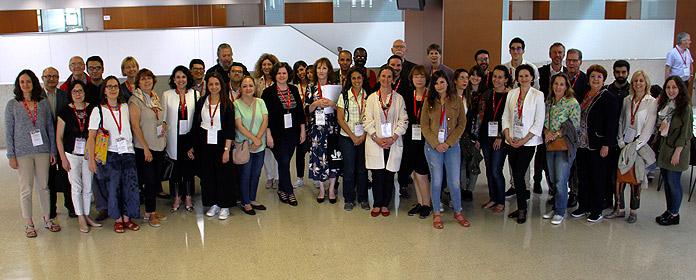More than 100 experts from 21 countries attended at the University of Navarra the congress of the association European Language for Specific Purposes
They have presented research on how languages are used in fields such as science, business, medicine, tourism and Education, among others.

PHOTO: Natalia Rouzaut
More than a hundred experts from universities in 21 countries attended the XVIII congress of the European association of Languages for Specific Purposes (AELFE). The meeting was organized by the project 'Public discourse' of the Institute for Culture and Society (ICS), the research center in Humanities and social sciences of the University of Navarra.
Scholars have presented papers on how languages are used in fields such as science, business, medicine, tourism and Education, among others. Sessions have been held in English, French, German, Spanish, Italian and Basque.
The main presentations were given at position by Ken Hyland, University of East Anglia (United Kingdom); Antonio M. Bañón, University of Almería; and Geert Jacobs, University of Ghent (Belgium).
Ken Hyland has shared the results of a research on teachers' and students' perceptions of feedback in disciplinary writing, that which promotes the use of writing across disciplines to support learning. The study concluded that teachers of English writing for academic purposes can help students better understand writing and its relationship to internship of any discipline.
speech and healthAntonio M. Bañón spoke about the analysis of speech applied to the field of health. He presented an overview of the programs of study on this issue, as well as the practical orientations that the research from Linguistics on speech and health has had or should have in the future. As he explained, there are at least three possible orientations in the analysis of the connections between speech and health: the speech as a demonstration of health or disease, the speech as tool generator of health or disease and the speech as a manifestation of a certain social construction of health and disease.
Geert Jacobs of Ghent University (Belgium) has discussed the ethnographicwork in linguistics around language and social interaction in professional settingssuch as multilingual business, news production, health care and science. She has focused on some discursive practices behind these environments and tried to show how ethnographic tools such as interviews and participant observation can shed light on their impact on the professional speech behind closed doors.
In addition to the three keynote speakers, experts from academic institutions in Algeria, Argentina, Austria, Belgium, Canada, Chile, China, Colombia, Croatia, Czech Republic, Denmark, France, Germany, Italy, Lithuania, Mexico, Russia, Spain, United Arab Emirates, United Kingdom, United States and United Arab Emirates.
